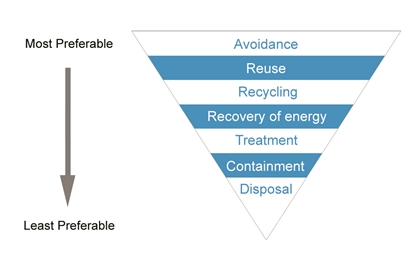Waste is defined by the Environment Protection Act 1970 as any matter, whether solid, liquid, gaseous or radioactive, which is discharged, emitted or deposited in the environment in such volume, constituency or manner as to cause an alteration of the environment.
Generally waste is any material or substance that is of no further use and has been discarded. If not properly managed waste can cause pollution and adverse impacts on the environment. Disposing of waste that could be reused or recycled is often a waste of resources, a lost opportunity and a waste of money.
Types of waste
Municipal wastes are typically collected from households by local councils through kerbside collections. Sustainability Victoria can provide a range of information on the amount of waste generated in Victoria, and the proportion of which is recycled.
Commercial and industrial wastes arise from commercial, industrial or trade activities and include construction and demolition wastes. Wastes generated from commercial or industrial sources that are potentially hazardous to humans or the environment require a higher level of control and are called prescribed industrial wastes (PIW). These wastes are regulated under the Environment Protection (Industrial Waste Resource) Regulations 2009.
Waste management hierarchy
The wastes hierarchy is one of eleven principles of environment protection contained in the Environment Protection Act 1970. The principles provide a framework for EPA’s decision making and are intended to benefit the Victorian environment and community. In making decisions, EPA takes all of the principles into account and applies them in an integrated manner.
The wastes hierarchy is an order of preference and states that waste should be managed in accordance with the hierarchy, with avoidance being the most preferred option and disposal being the least.
EPA is committed to reducing the amount of waste generated in Victoria and uses the wastes hierarchy in conjunction with the other 10 environment protection principles in the Act to achieve this aim.

What you can do to reduce household waste
Sustainability Victoria provides advice for various household waste related issues such as:
- general recycling
- television and computer recycling
- household battery recycling
- household chemicals disposal and recycling program
- used motor oil recycling.
Household chemical disposal
If you have expired, excess or unwanted household chemicals, you can dispose of them safely through Detox your home. It's free service to dispose of household chemicals. The collected items are recovered and diverted from landfill.
The program is administered by Sustainability Victoria in partnership with local councils and is funded by the Victorian landfill levy.
Permanent drop-off sites for paint and other products
Household paint, batteries, and fluorescent lights can be disposed of throughout the year at a permanent drop-off site.
Many of the permanent sites now offer a free to drop off household and trade paint service through Paintback.
Sustainability Victoria has more information and a full list of permanent drop-off sites or contact
your local council.